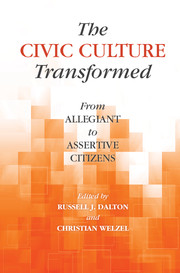Book contents
- Frontmatter
- Dedication
- Contents
- List of Figures
- List of Tables
- Contributors
- Foreword
- Preface and Acknowledgments
- 1 Political Culture and Value Change
- Part A Changing Values
- 2 Value Change over a Third of a Century
- 3 The Decline of Deference Revisited
- 4 Enlightening People
- Part B Changing Images of Government
- Part C The Impact of Cultural Change
- References
- Index
2 - Value Change over a Third of a Century
The Evidence for Generational Replacement1
Published online by Cambridge University Press: 05 January 2015
- Frontmatter
- Dedication
- Contents
- List of Figures
- List of Tables
- Contributors
- Foreword
- Preface and Acknowledgments
- 1 Political Culture and Value Change
- Part A Changing Values
- 2 Value Change over a Third of a Century
- 3 The Decline of Deference Revisited
- 4 Enlightening People
- Part B Changing Images of Government
- Part C The Impact of Cultural Change
- References
- Index
Summary
Four decades ago, Ronald Inglehart (1971) reported that younger Europeans held substantially different values than did their elders. Whereas older Europeans tended to value material security and domestic order, younger Europeans were more likely to value political liberties. Inglehart labeled these priorities as “acquisitive” and “postbourgeois,” but he subsequently used the terms “materialist” and “postmaterialist” (Inglehart 1977). This framework of value change subsequently had a major impact in reshaping our understanding of citizenship and political culture in advanced industrial democracies and is a foundation for the transition for allegiant to assertive values that is the primary theme of this book.
Many scholars view Inglehart’s prediction as a major insight. On the back of one of his most cited books, Culture Shift, Gabriel Almond (1990) argued, “Inglehart’s work is one of the few examples of successful prediction in political science.” The authors of the five-volume Beliefs in Government study found overwhelming evidence of a shift toward postmaterialism, away from religious values, and toward a redefinition of the Left-Right continuum. Elinor Scarbrough (1995, 156), who analyzed materialist-postmaterialist orientations, concluded, “indisputably, across much of Western Europe, value orientations are shifting.” General editors Max Kaase and Kenneth Newton (1995, 61) summed up the findings: “We find substantial support for the model which traces social changes to value changes, and value changes into political attitudes and behavior, especially through the process of generational replacement.” And Russell Dalton (2014, 89) concluded that in recent decades, researchers have advanced theories to explain how values are changing but argued that Inglehart’s research has been the most influential.
- Type
- Chapter
- Information
- The Civic Culture TransformedFrom Allegiant to Assertive Citizens, pp. 19 - 34Publisher: Cambridge University PressPrint publication year: 2014
- 6
- Cited by

